实用英语英语第一册
实用大学英语第一册_教案

一、课程简介《实用大学英语第一册》是为非英语专业学生设计的大学英语基础课程,旨在帮助学生掌握英语基本语法、词汇和口语表达,提高学生的英语听说读写能力,为后续英语学习打下坚实的基础。
二、教学目标1. 知识目标:(1)掌握英语基本语法和词汇;(2)了解英语国家的基本文化背景;(3)提高英语听、说、读、写能力。
2. 能力目标:(1)能够进行简单的英语口语交流;(2)能够阅读和理解英语短文;(3)能够运用所学知识进行写作。
3. 素质目标:(1)培养学生良好的英语学习习惯;(2)提高学生的自主学习能力;(3)增强学生的跨文化交际意识。
三、教学内容1. 单元一:问候与介绍2. 单元二:日常用语3. 单元三:购物4. 单元四:饮食5. 单元五:交通6. 单元六:天气与气候7. 单元七:工作与职业8. 单元八:娱乐与休闲9. 单元九:旅行10. 单元十:家庭与朋友四、教学方法1. 讲授法:教师讲解英语语法、词汇和口语表达,帮助学生掌握基础知识;2. 演示法:教师通过实际操作演示,让学生直观地了解英语口语和写作技巧;3. 讨论法:鼓励学生积极参与课堂讨论,提高学生的口语表达能力;4. 案例分析法:结合实际生活案例,让学生了解英语国家文化背景;5. 角色扮演法:通过模拟真实场景,让学生在实际语境中运用所学知识。
五、教学进度安排1. 第一周:导入课程,介绍课程内容、教学目标和方法;2. 第二至四周:学习单元一至三,重点掌握问候、介绍和日常用语;3. 第五至七周:学习单元四至六,重点掌握购物、饮食和天气与气候;4. 第八至十周:学习单元七至十,重点掌握工作与职业、娱乐与休闲、旅行和家庭与朋友;5. 第十一周:进行期中考试,检验学生的学习成果;6. 第十二至十三周:复习巩固所学知识,进行期末考试。
六、教学评价1. 课堂表现:包括出勤、课堂发言、参与讨论等;2. 作业完成情况:包括课堂作业、课后作业等;3. 考试成绩:包括期中考试、期末考试等;4. 学生自评:学生对自己的学习情况进行自我评价。
实用英语第一册unit4课后答案
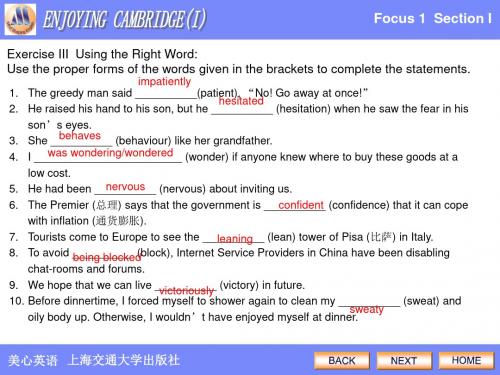
a. The kid __w_e_n_t__ into his room and shut the door. b. She tried to blow out all the candles on the cake in one __g_o_. (3) rest n. & vi. a. You may take a __r_e_s_t __ after that class. b. I see a bird __r_e_st_in_g_ on the roof. (4) drink n. & vt. a. Are there any soft _d_r_in_k_s__ in the refrigerator? b. She __d_r_in_k_s_ milk before going to bed every night. (5) feel n. & vi. a. I _a_m_ not __fe_e_l_in_g_ well now, so I can’t dine out with you. b. The _______ of the meeting is tense.
美心英语 上海交通大学出版社
Focus 1 Section I
Exercise VII.1 Translation: Translate the following sentences into Chinese. (1) She’s been dating him for months but she’s still not very serious. 她__跟_他__约__会__几__个_月__了__,__但__她__还_不__是__很__认__真_。____ (2) Tom came close to falling off the high wall. 汤__姆__差__点__从_高__墙__上__跌__下__来_。________________ (3) He goes for the world record. _他__想_创__造__世__界__纪_录__。______________________ (4) The magician escaped from the cage with his hands tied behind his back. _魔__术_师__双__手__反__绑_着__从__笼__子__里__逃_了__出__来__。_______ (5) She must have had a cold, for she had a fever and a runny nose. 她__一__定__是__感_冒__了__,__因__为__她_发__烧__,__还__流_鼻__涕__。____
《新编大学实用英语英语教程》(林立总主编)第一册教案

教案课程名称大学英语1教案书写规范与要求一、以每次课为一个备课单元书写。
二、每一备课单元书写下列内容:1.周次、课次、授课时间、章节名称;2.简要说明:教学目的、重点、难点、教学方法和授课手段(包括与课程相关的上机和实验、课件制作等);3.教学主要内容(教案主体)及教学方法手段;4.作业内容。
注:其余授课电子版文件待本课程结束后,交教务处统一刻成光盘存档。
大学英语1 课程授课总体计划书厦门软件职业技术学院教案厦门软件职业技术学院教案厦门软件职业技术学院教案厦门软件职业技术学院教案5 We are surprised at his great __improvement__(improve) in English.Activity 5 Fill in the blanks with the proper form of the words and phrases given in the box.1We got tired of his _endless_ boring speech.2 _Chatting_with friends is a good way of relaxation.3 Our country is rich in natural_resources__.4 Upon arrival,the singer are surrounded by a lot of fans and reporters.5 Tom _spends a lot of time in playing computer games every day.6To my surprise,only a third of the students in my class are interested in skiing.7He seems so quiet,but _actually he likes talking.8These days all the college students are very busy,especially the seniors.9 I sent her a bunch of flowers as a (an) expression of gratitude.10 Our college offers an excellent art program .Step II Grammar代词(Pronouns)一代词的分类二代词的用法1 人称代词注意:(1)人称代词在比较分句中作主语,用主格;作宾语,用宾格,如:She works harder than I (do).她比我用功。
实用英语综合教程第1册教案

实用英语综合教程第1册教案An Integrated Skills Course 1ContentsUnit1 Education (2)Unit2 Friendship (8)Unit3 Gifts (12)Unit4 Movies (18)Unit5 Our Earth (22)Unit6 Part-time Jobs (30)Unit 7 Health (36)Unit 8 Famous People (48)Unit 9 Festival (61)Unit 10 Animal Stories (73)Unit1 EducationObjectives1.Read what Bill Gates says about education;2.Build up your vocabulary relating to campus life;3.Learn something from an ancient Greek educator;4.Study different types of nouns;5.Write an introduction of yourself.Focuses1.Build up your vocabulary relating to campus life;2.Write an introduction of yourself.Outline1.Warm-up Discussion; study of words and expressions in Text A; Vocabulary Check (B and C)2.Discussion of Text A and the follow-up exercises (A and B)3.Active Words and V ocabulary Check; Grammar Tips4.Discussion of Text B and the follow-up exercises/doc/5040d052e87101f69e31955e.html prehensive Exercises (Ask the students to do the translation exercises outside of theclass beforehand)6.Practical WritingProcedures:Classroom ActivitiesI. Warm-up discussionQuestion: Do you know anything about Bill Gates such as his life and his educational background?Hint1)birthday and birthplace: October 28, 1995; Seattle, Washington2)educational background: Harvard University (education not completed)3)career: chairmen and chief software architect of Microsoft, the word‘s largest and most profitable software company.4)main events in his life:a.beginning programming computers at age 13;b.developing a version of the programming language BASIC for the first microcomputer in Harvard;c.founding Microsoft Corporation in 1975 at the age of 19II. Vocabulary in Text A1. education n.教育e.g. Children in poor areas receive free education.educate v.教育;教导educated adj.受教育的e.g. a well-educated maneducator n.教育家,教育者2. count v.派用场,点数e.g. 1) Every seconds counts.2) What counts more is whether you have tried your best.3) to count from 1 to 1004) Count these apples.3. advantage n.有利条件,好处;优点,优势e.g. This product has many advantages.advantageous adj.有利的,有益的,便利的e.g. It is highly advantageous to us.Phrase: take advantage of 很好的使用;利用e.g. take advantage of all educational opportunitiesAntonym: disadvantage n.不利;不利条件e.g. His bad health is a great disadvantage to him when he looks for work.4. lifetime n.一生,终生e.g. 1) a lifetime guarantee2)lifetime membership3) In my father‘s lifetime there have been many changes in the village.5. part-time adj.& adv.兼职的(地)e.g. 1)a part-time job2)He works part-time.full-time adj.全职的e.g. a full-time housewife6. programmer n.程序师,编程员program v.编制程序e.g. Please program the computer to do the job instead of doing it manually(手工操作).7. discourage vt. 不鼓励;使泄气,使失去信心e.g. His parents discouraged him from joining the air force.discouraged adj. 泄气的,失去信心的discouraging adj.使人泄气的,使人失去信心的e.g. 1) If you meet difficulty in your study, don‘t be discouraged.2) It is discouraging that I didn‘t k now how to solve the problem.Antonym: encourage vt.鼓励e.g. I encouraged her to work hard and to try to pass the examinations.courage n. 勇敢,勇气e.g. David showed great courage when he saved the child from the burning house.8. diploma n. 文凭,毕业证书e.g. a college diplomadiplomatic adj. 外交的,从事外交的e.g. Julia joined the diplomatic service after her graduation from university.9. project n.项目,课题e.g. 1) an impossible project2) The professor is directing a research project.Synonym: plan10. highly adv. 高度地;非常e.g. 1) a highly interesting story2) a highly paid jobPhrase: speak/ think highly of 赞扬,对…给予很高评价e.g. The leader speaks / thinks highly of our work.11. focus v.(使)集中;(使)聚焦e.g. 1) to focus (one‘s mind) in work2) All eyes focused on the speaker.focus n.(兴趣活动等的)中心,焦点e.g. Because of his strange clothes, he immediately becamethe focus of attention when heentered the office.12. range n. 范围e.g. You have a wide range of choices.range vi.在某范围内变化e.g. The temperature ranges from 10 to 20 degrees.13. attend v.参加,出席e.g. attend schoolattend a lectureattendance n.出席,到场14. automatically adv.自动地e.g. the machine operates automatically.automatic adj.自动的e.g. We have an automatic washing machine.15. drop out of 退学,不参与,退出e.g. 1) He dropped out of school at the age of 10 because his family was too poor to afford thetuition.2) She decided to drop out of the competition because it was not fire.16. chance of a lifetime 千载难逢的良机,一生中唯一的机会e.g. It‘s the chance of a lifetime. You will regret it the rest of your lif e if you don‘t take it.17. try out 试验,考验e.g. She bought a cookbook and tried out a few new recipes.18. in short 简而言之,总之e.g. In short, you should study hard for a better future.Synonym: in brief/ to sum up/ all in all/ in conclusionIII. Language Points in Text A1.They want to know what to study, or whether it?s Ok todrop out of college since that?s what I did.what to study: This is a wh-word + infinitive structure used as the object, which can be changed into an object clause. Wh-word + infinitive structure can be used as a subject, an object, or an appositive clause(同位语从句),for example:1)How to improve their English is often discussed among the students.2)We haven‘t decided when to visit the place.3)You haven‘t answered my question about wher e to get these books.it?s Ok to drop out of college: Here ―it‖ is used as a formal subject, and the actual subject is the infinitive structure ―to drop out of college‖. The general pattern is ―It is + adj. + (for/ of + sb.) todo sth.‖ More examples:1)It was very thoughtful of her to come to see me when I was ill.2)It‘s easy for me to see through his trick.that?s what I did: ―what I did‖ here is a predictive clause (表语从句)introduced by ―what‖. It is always structured in the form of ―subject + be/ look/ remain/ seem + predictive clause‖ and can be introduced by such words as ―that‖ (always omitted), and other wh-words, for example:1) It seems (that) it is going to rain.2) This is why I refused to attend the meeting.2. As I?ve said before, nobody should drop out of college unless they believe they face the chance of a lifetime.As I?ve said before: This is a non-restrictive relative clause(非限制性关系从句) introduced by ―as‖(正如…的那样), which can be placed at the beginning or at the end of the sentence. Moreexamples:1) As people expected, she was admitted to Beijing University.2) Hundreds of people were killed in the earthquake, as I have learned from the newspaper. unless: is a conjunction for an adverbial clause of condition (条件状语从句), which equals ―if…not…‖(除非).e.g. I won‘t leave unless the rain stops.3. In my company?s early years, we have a bright part-time programmer who planned to drop out of high school to work.planned to: intend to do sth.计划、打算做某事e.g. I plan to make a trip to Beijing during the summer vocation.who planned to …work: a restrictive relative clause introduced by ―who‖ since its antecedent is a person and serves as the subject in the clause. The relative pronoun ―that‖ can be used here too. More examples:1) The young man who sits there quietly is my brother.2) I don‘t like people that pry into others‘ private business.4. Having a diploma certainly helps somebody who is looking to us for a job.look to sb./ sth.: to depend on sb. or sth. for help or advice 指望,依赖e.g. We look to you for support.5. High school and college offer you the best chance to learn many things and to do projects with others that teach you about team spirit.that teach you about team spirit: This is a restrictive relative clause introduced by ―that‖, whose antecede nt acts as the subject of the clause. Actually the relative clause introduced by ―that‖ can be used to modify both the person or the thing,and the roll of ―that‖ can be either the subject or the object.e.g. He was the only one that I knew there.I haven‘t been to the place that you have mentioned.6. In high school there was a time when I was highly focused on writing software, but for most of my high school years I had many interests.when …software: This is a relative clause introduced by the relative a dverb ―when‖, which acts as the adverbial of time in the clause.e.g. 1) There was a time when I completely lost my self-confidence.2) I will never forget those days when we were together.7. For me, classroom is not the only place where you can learn.where you can learn: This is a restrictive relative clause introduced by the relative adverb ―where‖, which is used as the adverbial of place in the clause.e.g. 1) Do you still remember the restaurant where we had dinner last night?2) This is the place where he stayed his whole life.8. In short, it?s a real mistake not to take the chance to studya wide range of subjects and to learn to work with other people because education does count.it?s a real mistake not to take the chance: This is an example of a negative infinitive structure, where ―not‖ is placed before an infinitive.e.g. 1) We are asked not to speak loudly in class.2) It is a good idea not to go out on such a rainy day.IV. Focus on Grammar名词(Noun )一、名词的概念表示人、事物或抽象概念的词叫做名词。
实用英语第一册教案.doc
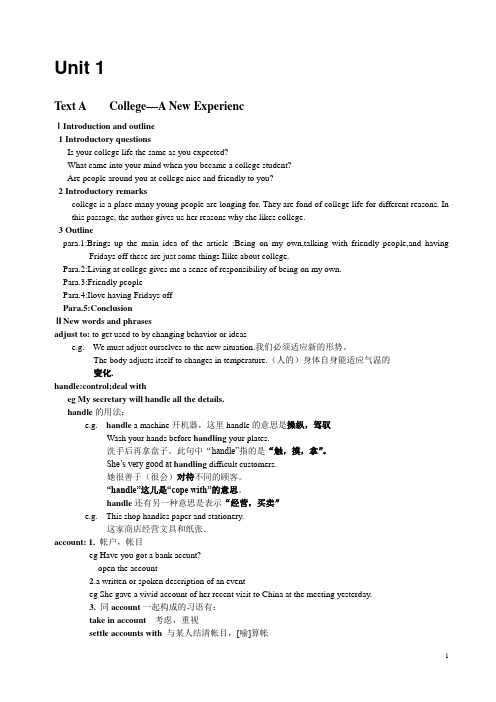
Unit 1Text A College—A New ExperiencⅠIntroduction and outline1 Introductory questionsIs your college life the same as you expected?What came into your mind when you became a college student?Are people around you at college nice and friendly to you?2 Introductory remarkscollege is a place many young people are longing for. They are fond of college life for different reasons. In this passage, the author gives us her reasons why she likes college.3 Outlinepara.1:Brings up the main idea of the article :Being on my own,talking with friendly people,and having Fridays off these are just some things Ilike about college.Para.2:Living at college gives me a sense of responsibility of being on my own.Para.3:Friendly peoplePara.4:Ilove having Fridays offPara.5:ConclusionⅡNew words and phrasesadjust to: to get used to by changing behavior or idease.g. We must adjust ourselves to the new situation.我们必须适应新的形势。
新编实用英语第一册教案
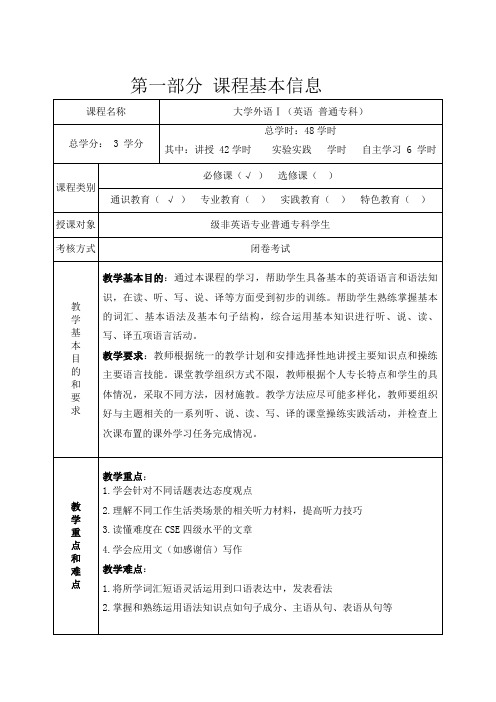
第一部分课程基本信息第二部分教学设计一、课程与教材分析(一)课程分析《大学英语》是高等教育的一个有机组成部分,是大学生的一门必修的基础课程。
大学英语教学是以英语语言知识与应用技能、学习策略和跨文化交际为主要内容;以外语教学理论为指导,并集多种教学模式和教学手段为一体的教学体系,旨在培养学生英语综合应用能力,特别是听说能力,使他们在今后工作和社会交往中能用英语有效地进行口头和书面的信息交流,同时增强其自主学习能力、提高综合文化素养,以适应我国经济发展和国际交流的需要。
(二)教材分析(突出针对课程需要,合理选择教材和教参)《新编实用英语》(第五版)系列教材国家“十三五”规划教材,是严格按照国家职业教育目标和要求精心设计的立体化公共外语教材,教材内容贴合日常交际和职场需求,在主题类别、语篇类型、语言知识、文化知识等方面均与《新课标》紧密对应,历经多年教学实践,得到了广大高职高专院校师生的充分认可。
教材立足“立德树人”根本教育任务,探索外语“课程思政”建设,注重中华优秀文化的表达,助力培养德才兼备、德智体美劳全面发展的人;注重培养学生的英语学科核心素养,助力学生形成关键能力和必备品格以及形成正确的世界观、人生观和价值观,努力将大英教材的思想价值渗透作用最大化,以美育人、以德润人,以文化人,潜移默化中引导学生坚定“四个自信”,润物无声中实现“育人育才”。
教材聚焦典型生活和职业场景,以富有生活化、职业性和时代性的选材,将英语技能放在职业场景中操练,注重对学生英语基本功和职业技能的全面培养,并创设“线上+ 线下”混合式外语教学生态,资源以立体化、多模态形式呈现,是比较适合我校学生实际的教材。
二、学生情况分析(一)学生基本情况本课程是面向我校非英语专业普通专科学生的公共必修课,所教大部分学生有较强的学习积极性、主动性和自觉性,具备比较基本的英语阅读和简单写作的能力,但是听力水平普遍较低,词汇量相对有限,在写作和翻译方面能力较为欠缺。
《新编实用英语》第一册
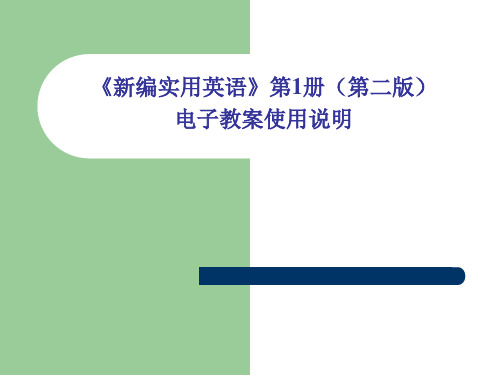
五、可做适当修改
本电子教案只给出了部分较难的练习答案, 但并不意味着就不做其它练习题。使用者可根据 各自的课时情况、学生的英语水平等因素自行确 定做练习的内容和方法,并可对本电子教案进行 修改,以满足个性化教学的需要。 由于制作这种形式的电子教案是一次全新的尝 试,本电子教案还存在着一定的不足和缺陷。欢 迎广大教师在使用的过程中提出宝贵意见,使其 不断改进和完善。
制
负 责 人:刘 然
作
人
பைடு நூலகம்
员
技术指导: 胡俊宇 制 作 人: 辛会元、刘 岩、于 轶、冯 威 金品卓、曹艳春、曹东波、杨欣瑶
制作单位:沈阳工程学院
高等教育出版社 高等教育电子音像出版社
四、教师在课堂上的作用
教师在课堂上的角色不只是英语知识的传授者, 更应该是培养学生进行语言交际能力的训练者,也 就是互动课堂活动的设计者和组织者。教师决不能 仅仅成为电子教案的演示者。因而,需要教师组织 学生对电子教案中的每个画面进行各种形式的练习。 例 如 : 当 电 子 教 案 中 出 现 “ Practice the following sentences.” 时,可以就所给出的例句 进行反复朗读、英/汉互译、背诵、或听写等练习。
《新编实用英语》第1册(第二版) 电子教案使用说明
一、本电子教案的特点
本电子教案完全是根据教师参考书中“参考
教案”的内容来制作的。其最大的特点是:1)
使用简单、方便,完全按照教师授课的时间和 步骤来制作。2)突出课堂教学活动的设计和 指导,有利于培养学生的语言应用能力。
二、与教科书的关系
电子教案是教师在课堂上授课的辅助工具,它不 能代替教科书。因而,在使用本电子教案时,必须 与教科书一起使用。例如:当电子教案中出现 “Reading of the Passage”界面时,就需要教师 指导学生采用多种方式朗读教材中的课文。又如: 当出现“ Read the printed materials in Listen and Decode in ONE minute.”界面时,就应在教材 中找到相对应的内容进行阅读。
新编实用英语第一册对话
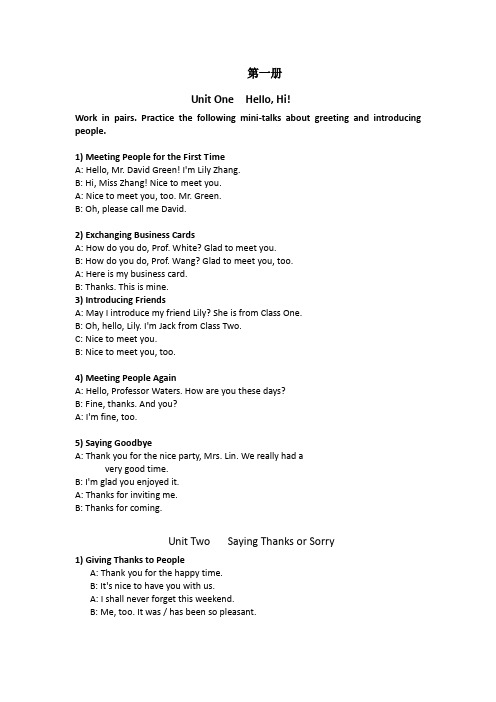
第一册Unit One Hello, Hi!Work in pairs. Practice the following mini-talks about greeting and introducing people.1) Meeting People for the First TimeA: Hello, Mr. David Green! I'm Lily Zhang.B: Hi, Miss Zhang! Nice to meet you.A: Nice to meet you, too. Mr. Green.B: Oh, please call me David.2) Exchanging Business CardsA: How do you do, Prof. White? Glad to meet you.B: How do you do, Prof. Wang? Glad to meet you, too.A: Here is my business card.B: Thanks. This is mine.3) Introducing FriendsA: May I introduce my friend Lily? She is from Class One.B: Oh, hello, Lily. I'm Jack from Class Two.C: Nice to meet you.B: Nice to meet you, too.4) Meeting People AgainA: Hello, Professor Waters. How are you these days?B: Fine, thanks. And you?A: I'm fine, too.5) Saying GoodbyeA: Thank you for the nice party, Mrs. Lin. We really had avery good time.B: I'm glad you enjoyed it.A: Thanks for inviting me.B: Thanks for coming.Unit Two Saying Thanks or Sorry1) Giving Thanks to PeopleA: Thank you for the happy time.B: It's nice to have you with us.A: I shall never forget this weekend.B: Me, too. It was / has been so pleasant.2) Congratulating People on Winning a PrizeA: Congratulations on winning the first prize!B: Thank you very much.A: We all feel very proud of you.B: Thanks. Let's go and have a drink.3) Expressing Thanks for Others' HelpA: Professor Smith, thank you very much for your adviceon my paper!B: It's my pleasure to be of some help.A: I could never be so successful without your help.B: I always know that you can do well.4) Making Apologies to OthersA: I'm so sorry for being late again.B: Never mind, but it's a lesson for you to learn.A: Please forgive me one more time.B: Oh, just see it doesn't happen again, will you?5) Expressing RegretA: I'm sorry I didn't send the e-mail yesterday.B: Forget it. That's OK.A: I wish I could make up for it.B: I don't think it's your fault.Unit4 Punctuality and Culture 1) Asking for an Appointment with the ManagerA: I'd like to make an appointment with your manager. Do you think I could see him sometime this morning?B: Sorry, he's fully booked this morning.A: How about tomorrow morning then?B: Yes, I think tomorrow morning would be fine.2) Asking to Meet Mr. PetersonA: Mr. Peterson, I wonder if it would be convenient to meet you today.B: Let me see. I'm free this afternoon. Is that all right for you? A: Well, I've got a meeting from 2 to 4. Are you free tomorrow morning?B: No problem. Let's make it at 10 then.3) Asking to Change the Appointment with Dr. JohnsonA: I'd like to change the appointment with Dr. Johnson from Tuesday to Thursday.B: I'm afraid he won't be available on Thursday morning.A: What time would be convenient for him? Will 2 p.m. do?B: Yes, that'll be fine.4) Asking About the Working Hours of a Ticket OfficeA: What are the office hours?B: Well, the office hours are from 9 a.m. to 6 p.m.A: Do you work on weekends?B: On Saturday the office is open from 9 a.m. to 3 p.m., but on Sunday we are closed.5) Asking About the Flights for MacaoA: Do you have flights to Macao?B: We have only one flight to Macao each week, at 1:40 p.m. Wednesday.A: When does it arrive in Macao?B: At 3:40 p.m.Unit fiveMini-talks1)Which Table to Choose?Jane: Waiter, a table for two, please.Waiter: This way, please. Is this table alright?Jane: I would prefer the one near the window.Waiter: Sorry, it was reserved an hour ago. How about that one?Jane: That’s ok. Thank you.2)What do You Recommend?Waiter: What would you like to have?Zhou: I know nothing about American food here. What do you recommend? Waiter: What do you prefer, meat or fish?Zhou: I’d rather have meat.3)I’d Like Something Typically Chinese.Waiter: Hello, Madam. May I help you?Jenny: Yes. I’d like something typically Chinese.Waiter: Fine. We serve a wide range of typical Chinese food. Here’s the menu. Jenny: Good. I’d like to try so me Shanghai cuisine.4)May I Have a Bit More of This Wine?Zhang: May I have a bit more of this wine?Steven: Sure. Let me pour it for you. Say when.Zhang: Thank you. That’s enough.Steven: Ok. Help yourself to more meat if you want.5)Let Me Pay the Bill/Check.Li Ming: Let me pay the bill today.Tom: Oh, no! Let’s go Dutch. We’re both students after all.Li Ming: Ok. It’s 15 dollars altogether. So 7 dollars and 50 cents each. Right? Tom: That’s right. Waiter, bring the bill.第一册Unit 61) Talking About a Sports Event PosterA: Look at the poster!B: Oh, there will be a fun sports meet in our school.A: Sunday morning, in the stadium.B: And everybody is welcome!2) Suggesting Taking Part in a Sports EventA: Are you going to join the swimming contest? Youare a good swimmer.B: A swimming contest?A: There is a poster of a swimming contest at the schoolgate.B: Great! I'll go and check the details.3) Inviting One to an Outdoor ActivityA: Our students' union will hold a cycling race this weekendaround the city.B: Cycling? I love it.A: Would you like to come with us?B: Sure.4) Talking About a Sports Event with a FriendA: You know, the City Inter-college Basketball Championshipwill be held in our university this May.B: Yes, I've seen posters almost everywhere on campus.A: I am eager to watch the game.B: Me, too. I can hardly wait.5) Commenting on an Outdoor ActivityA: The 3rd International Walking Festival is drawing near.B: Yes, there are posters everywhere around the city.A: Walking is a healthy outdoor activity.B: And we can relax both our mind and our body.第一册Unit Seven Holiday Celebrations1) Talking About Giving or Going to PartiesA: The Students' Union is organizing a dancing party for us.B: Really? When and where will the party be held?A: It's at 7:30 p.m., January 1.B: On New Year's Day? That must be wonderful!2) Telling a Foreign Friend How You Observe Father's DayA: Do you observe Father's Day in China?B: Yes. More and more people have begun to celebrate it.A: So what gift have you prepared for your dad?B: Look at the fishing tackle. I'll go fishing with my dad.3) Inquiring About a Christmas PartyA: When and where is the Christmas Party being held?B: It's going to be at the College Hall on Christmas Eve.A: I'd like to learn more about English holidays at the party.B: And if you become a member of the student club, you can also make more friends.4) Discussing the Poster of a School Team Basketball MatchA: What is on the poster there? It looks so nice.B: Let's have a look. Oh, there is going to be a basketball match.A: Wonderful. Is it between school teams?B: Yes, Xinhua Technical college vs. Wuzhou Professional College. 5) Introducing a Chinese FestivalA: Is there any typical Chinese festival you celebrate?B: Yes, there are many. The Dragon Boat Festival is one of them.A: What special activities do you have during the festival?B: Dragon boat races are popular and we also eat delicious Zongzi.第一册unit 81) Complaining of One’s Illness to a DoctorA: Oh, doctor, I feel so terrible!B: Let’s see. What seems to be the problem?A: My whole body hurts.B: Perhaps you’ve got a cold. Take this medicine.2)Asking About Taking a MedicineA: How shall I take the medicine?B: Two pills a time, three times a day.A: Before or after meals?B: After meals.3)Showing Concern for a FriendA: What’s the matter/trouble with you?B: I’ve got a bad heada che.A: Have you seen a doctor?B: Yeah. He asked me to have a good rest.4)Giving Medical AdviceA: You’ve got another bad tooth.B: Well, I often have very bad toothaches.A: You should have dental checks more often.B: Yeah. But I just hate to see the dental drill.5)Giving a PrescriptionA: What’s wrong with you?B: I couldn’t sleep well.A: Let me prescribe the BEST medicine for you!B: I know what you’ll say. You want me to do more exercise.。
实用英语第一册教案.doc
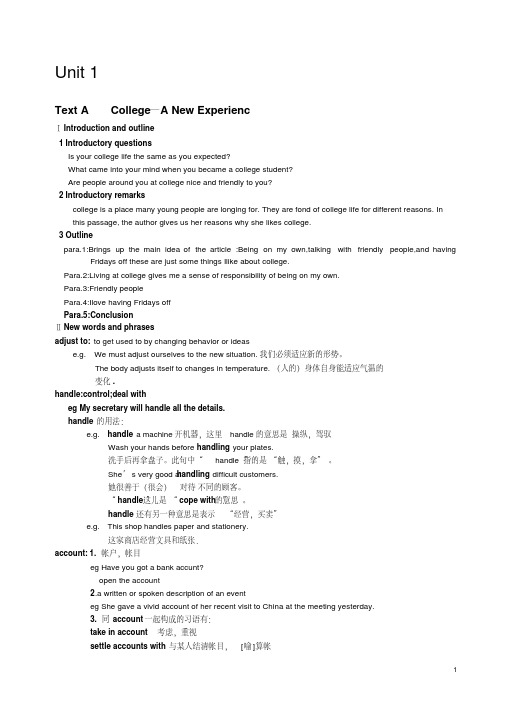
Unit 1Text A College—A New ExperiencⅠIntroduction and outline1 Introductory questionsIs your college life the same as you expected?What came into your mind when you became a college student?Are people around you at college nice and friendly to you?2 Introductory remarkscollege is a place many young people are longing for. They are fond of college life for different reasons. In this passage, the author gives us her reasons why she likes college.3 Outlinepara.1:Brings up the main idea of the article :Being on my own,talking with friendly people,and having Fridays off these are just some things Ilike about college.Para.2:Living at college gives me a sense of responsibility of being on my own.Para.3:Friendly peoplePara.4:Ilove having Fridays offPara.5:ConclusionⅡNew words and phrasesadjust to: to get used to by changing behavior or idease.g. We must adjust ourselves to the new situation.我们必须适应新的形势。
《新编实用英语》第一册教案
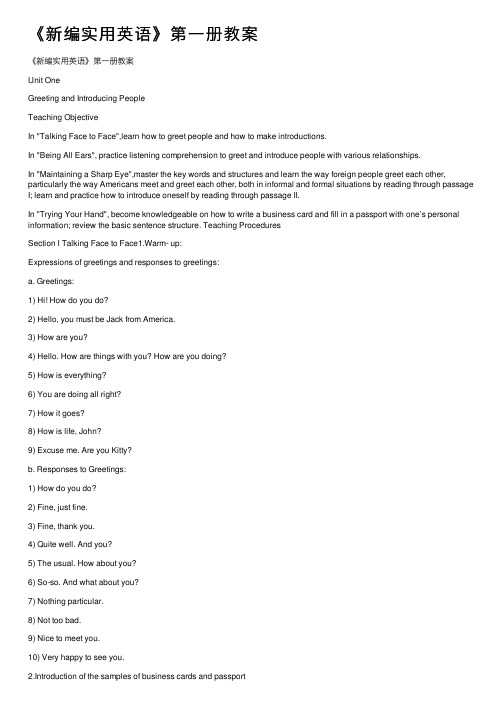
《新编实⽤英语》第⼀册教案《新编实⽤英语》第⼀册教案Unit OneGreeting and Introducing PeopleTeaching ObjectiveIn "Talking Face to Face",learn how to greet people and how to make introductions.In "Being All Ears", practice listening comprehension to greet and introduce people with various relationships.In "Maintaining a Sharp Eye",master the key words and structures and learn the way foreign people greet each other, particularly the way Americans meet and greet each other, both in informal and formal situations by reading through passage I; learn and practice how to introduce oneself by reading through passage II.In "Trying Your Hand", become knowledgeable on how to write a business card and fill in a passport with one’s personal information; review the basic sentence structure. Teaching ProceduresSection I Talking Face to Face1.Warm- up:Expressions of greetings and responses to greetings:a. Greetings:1) Hi! How do you do?2) Hello, you must be Jack from America.3) How are you?4) Hello. How are things with you? How are you doing?5) How is everything?6) You are doing all right?7) How it goes?8) How is life, John?9) Excuse me. Are you Kitty?b. Responses to Greetings:1) How do you do?2) Fine, just fine.3) Fine, thank you.4) Quite well. And you?5) The usual. How about you?6) So-so. And what about you?7) Nothing particular.8) Not too bad.9) Nice to meet you.10) Very happy to see you.2.Introduction of the samples of business cards and passport3. Practice the two dialogues in Follow the Samples4. Practice dialogues according to the given tasks5. ExercisesSection II Being All EarsSee the textbook.Section III Maintaining a Sharp EyePassage I The Way Americans GreetText-Related Information1. GreetingThe simplest thing to say is "Good morning," "Good afternoon'" or "good evening." This greeting is given to one whom you know only slightly, or to any one you are passing quickly. "How are you" is usually used when you are not in such a hurry. No answer is expected other than "Fine, thank you." "Hello" is the commonest form of greeting between good friends.2. When to Shake HandsIt is customary to shake hands when you first meet someone. And usually friends shake hands when they meet after not having seen each other for some time. However it is not necessary to shake hands.3. Common Titles in Englisha. Mr.:“先⽣”a courtesy title for any male adult not styled “Sir”, “Dr.” etc. used before the man’s family name or his position.b. Mrs.:“太太”a courtesy title for any married woman not styled “lady”, “Dr.”etc. used before her husband‘s surname.c. Ms.: “⼥⼠” a courtesy title for a woman, whether she is married or not, followed by the family name.d. Miss: “⼩姐”A title used to address an unmarried woman or a girl. It is followed by the family name. Miss can also be used as the title of address to an (esp. unknown) unmarried woman. In this case, it is not followed by the name.e. Lady: “夫⼈、太太、⼥⼠”a courtesy title for a woman with dignity or social grace. It is also an English title for the wife of a knight or a baronet.f. Dr. (Doctor): “医⽣、博⼠”the title of a medical practitioner or the title of the holder of the highest university degree. e.g. Doctor of Philosophy (PhD).g. Prof. (Professor):“教授”The title to address a university teacher of the highest rank in a faculty.h. Officer: “官员,警察先⽣” The title to address a person holding a publicappointment, aposition of responsibility and trust, such as a policeman or a customs officer.i. Sir: “先⽣、长官、爵⼠”A form of polite address to a man; A title preceding the first name of a knight (爵⼠) or a baronet (准男爵); A form of address in writing to a stranger or in business letters.4. Formation of Common English NamesA common English name is usually composed of two or three parts: the first name is also called forename. If the person is a Christian, his first name will be given at his baptism, so it is also called the given name or the Christian name. Middle name is the second given name. When written, middle name is often shortened to the initial letter. Surname is often the father‘s family name, so it is also called family name or last name. For example: Anne Louise Strong, George B. Show.Text ExplanationPara. 1Americans often greet each other simply with “Hello”or “Hi”. They believe such an informal greeting often implies a close and friendly relationship. Similarly, Americans do not have a formal “farewell”. They will just wave “good-bye” to the whole group. Or perhaps, they will simply say “Bye”, “So long” or “Speaking of time, I’ve got to run” and then leave. To Americans, a friendly and informal relationship is themost important thing.Language Points:1.Explanation of Difficult Sentences1) The Way Americans GreetAnalysis: In this title, in which is omitted after The way.“in ... way”means (to do something) by means of a certain method. Translation: 美国⼈的致意⽅式Example: I think the way she runs her bookshop is worth studying.2)Speaking of ... time, I’ve got to run.Analysis: A present participle clause used as an adverbial of cause/time. It means “when it comes to time, I’m reminded of …”Translation: 说到时间,我得赶紧跑了。
实用英语综合教程第一二册教学设计
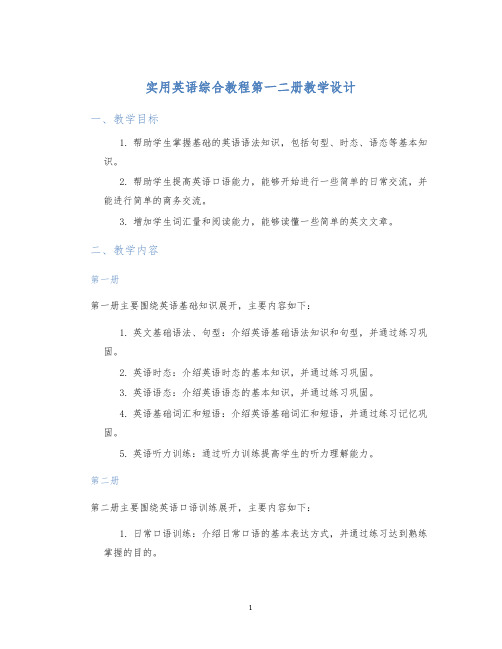
实用英语综合教程第一二册教学设计一、教学目标1.帮助学生掌握基础的英语语法知识,包括句型、时态、语态等基本知识。
2.帮助学生提高英语口语能力,能够开始进行一些简单的日常交流,并能进行简单的商务交流。
3.增加学生词汇量和阅读能力,能够读懂一些简单的英文文章。
二、教学内容第一册第一册主要围绕英语基础知识展开,主要内容如下:1.英文基础语法、句型:介绍英语基础语法知识和句型,并通过练习巩固。
2.英语时态:介绍英语时态的基本知识,并通过练习巩固。
3.英语语态:介绍英语语态的基本知识,并通过练习巩固。
4.英语基础词汇和短语:介绍英语基础词汇和短语,并通过练习记忆巩固。
5.英语听力训练:通过听力训练提高学生的听力理解能力。
第二册第二册主要围绕英语口语训练展开,主要内容如下:1.日常口语训练:介绍日常口语的基本表达方式,并通过练习达到熟练掌握的目的。
2.商务口语训练:介绍商务口语的基本表达方式,并通过模拟实践让学生逐渐掌握商务口语的应用。
3.阅读训练:介绍英文文章阅读技巧,并通过精选文章让学生进行阅读练习。
4.写作训练:介绍英语写作技巧,并通过练习帮助学生提高英语写作水平。
三、教学方法本教程将采用以下教学方法:1.课堂教学:老师上台讲解和练习巩固。
2.分组练习:将学生分成小组,进行语言交流练习。
3.个人练习:学生进行个人听力、阅读和口语训练。
4.个人作业:学生通过完成课后作业,进一步提高自己的英语能力。
四、教学评估本教程将采用以下评估方法:1.考试测试:定期组织考试,检验学生的英语能力和掌握情况。
2.作业检查:对学生的课后作业进行检查和点评。
3.口语评估:观察学生在课堂上和小组练习中的表现,进行评估。
五、总结通过本教程的学习,学生可以基本掌握英语基础语法知识,提高英语口语、阅读和写作能力。
此外,通过小组练习和个人练习,学生不仅可以增加语言实践经验,更能在参与讨论和交流中不断提高自己的口语流利度和思维能力,为将来的英语学习和职场发展奠定基础。
实用英语教程 第一册 课后练习答案
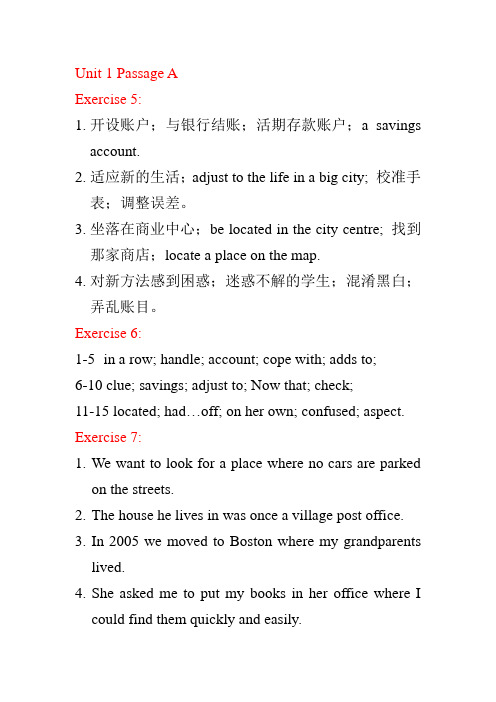
Unit 1 Passage AExercise 5:1.开设账户;与银行结账;活期存款账户;a savings account.2.适应新的生活;adjust to the life in a big city; 校准手表;调整误差。
3.坐落在商业中心;be located in the city centre; 找到那家商店;locate a place on the map.4.对新方法感到困惑;迷惑不解的学生;混淆黑白;弄乱账目。
Exercise 6:1-5in a row; handle; account; cope with; adds to;6-10 clue; savings; adjust to; Now that; check;11-15 located; had…off; on her own; confused; aspect. Exercise 7:1.We want to look for a place where no cars are parkedon the streets.2.The house he lives in was once a village post office.3.In 2005 we moved to Boston where my grandparentslived.4.She asked me to put my books in her office where Icould find them quickly and easily.5.They showed us the place where they once lived andworked.Exercise 8:1-5 working; to be…talking; not turning on; taking…to get; going;6-10 laughing; going; swimming; living; carrying. Passage BExercise 3:1-5 opportunity; stay young; grew up; secret; achieved; 6-10 smiled at; take on; shared; introduce; turn around; 11-15 challenge; looked around; experience; retire; dreaming of.Exercise 4:1.In our first class, we met a woman who was highlysuccessful in her business.2.I was lucky enough to have a kind and patient teacherwho often praised all of the students.3.The man who retired at 54 went back to work for thecompany on a part time basis.4.These students who attended the course passed theexam with a B.5.He rang James who was a good friend as well as thefamily doctor.Skills Development and PracticePractice 3:3-1-1-8: 一般阅读;定期航班;固定工作;常客;匀速;普通汽油;规则动词;正规军。
新编实用英语第一册课后答案
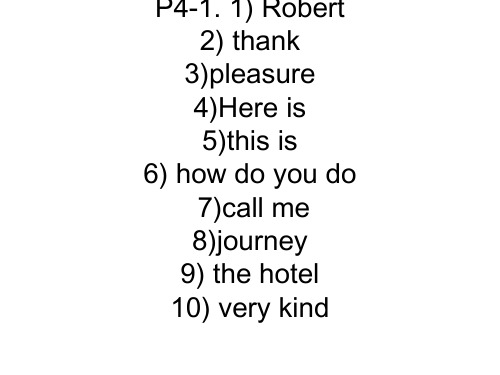
• P8-5 1) introduction are important because a proper introduction will leave a good first impression on others . • 2) A typical Americans introduction usually includes a greeting , a handshake, an exchange of names and cards and a few words about each other’s work . • 3)This is the first time Jack and Paul have met each other . • 4)They first shake hands , and then they present card to each other .
• 5)Paul works for the software park company , and Jack has his own company . • 6)Roger smith is named president of this company 7)Jack thinks that Roger needs sometime to get more experience . • 8) In the end , paul and Jack say good-bye and leave each other in a hurry .
• P6-2 1) He is an ofrom England • 2)He studies Chinese • 3)He is student at the same university , He is in the third grade • 4)England , He wants to study for his master’s degree there. • 5) Both of them are online . So they can keep in touch through e-mail in the internet
实用大学英语第一册听力原文和课后习题答案

第一册UNIT ONE听力原文Section A Listening and SpeakingPart One Pronunciation略Part Three DialoguesPage 6 Dialogue 1ExerciseⅠ. Listen to the dialogue and decide whether the following statements are true (T) or false (F).Teacher: Good morning, everyone.Students: Good morning, Mr. Wang.T: Who is on duty today?S: I am. Everyone is here except Li Ping. Today is Thursday, September 10th, Teacher’s Day. Happy Teacher’s Day, Mr. Wang. Thank you very much for teaching us so well. Here is a card for you, with our best wishes.T: Oh, such a lovely card. Thank you. By the way, I went into your dormitories last night. I found the floor was dirty and some people forgot to put away their bedclothes. I hope you can tidy up your rooms everyday, OK?S: Yes, Mr. Wang.T: Now let’s get started.(Just then Li Ping comes.)Li Ping: Sorry, Mr. Wang, I’m late.T: Could you tell me why?Li Ping: This morning I wanted to buy you some fresh flowers for Teacher’s Day. I’mreally sorry. I looked around the whole street and s till couldn’tfind any.T: Never mind. Studying hard is the best present for me. Well, come in and sit down.Let’s begin our lessons.ExerciseⅡ. Listen to the dialogue again and fill in the blanks with the information you’ve heard.Page 7 Dialogue 2Exercise Ⅰ. Listen to the dialogue and complete the following statements with the information you’ve heard.Students: Mr. Wang, what is today’s ho mework?Teacher: For today’s homework, do the exercis es on Page 10.S: Shall we do them orally or write them in our exercise books?T: First write them down in your exercise books, then practice them orally until you have learned all of them by heart.S: It will take us a lot of time.T: I won’t ask you to hand in your exercise books until the day after tomorrow. Can you manage to recite them next week? I think you’ll have plenty of time.S: Well, we’ll try to finish the homework on time.T: OK. If you have any questions, come to my office tomorrow afternoon.I will beavailable from 1:30 to 5:00.S: Thank you very much.ExerciseⅡ. Listen to the dialogue again and answer the following questions.Part Four PassagesPage 8 Passage 1Now you’ll hear a passage. Listen to it and complete the following sentences according to the information you’ve heard with the words and phrases provided in the box. Then listen to it again and check your answers.A Way to Improve English Listening QuicklyFew days ago, I watched a video which was taken by certain member of Taiwan University for teaching students how to improve English listening skill. Some advice is given from the lecturer. The source of the information is the Writing Center website.Today, I try to watch English movie without Chinese translating subtitles. At the beginning, it is very difficult to understand what the actors are talking about. But gradually, I can figure out more and more words. I know that the method does work to improve my listening skill. Certainly! My English listening ability is not good enough. It is fun to learn things and I always believe that.Page 8 Passage 2Now you’ll hear a passage, which is followed by four questions. Listen to it and choose the best answer to each of the following questions. Then listen to it again and check your answers.Many Chinese students have studied English for more than ten years. However, when they meet a native speaker, they are still unable to speak English very well. They seem to have mastered the basic language structure, but a conversation in English will make them feel uncomfortable. They are afraid that other people might find out their mistakes.Many students who are bad speakers of English can write English perfectly. This proves that they are unable to think about their ideas in English. The center of the problem is that they lack practice and positive belief in themselves.Why should you be afraid? Do you fear those native speakers with whom you are speaking? Don’t be shy! They will not laugh at yo u just for a little mistake you make. The best way to get rid of mistakes is to learn to speak by speaking more. I am sure that continual practice will help you succeed.习题答案及参考译文Section A Listening and SpeakingPart One PronunciationⅠ. 清辅音:浊辅音:Ⅱ. 略Part Three DialoguesDialogue 1Ⅰ. 1. T 2. F 3. TⅡ. 见听力原文Ⅲ. 略Dialogue 2Ⅰ. 见听力原文Ⅱ. 1. On Page 10.2. First write them down in their exercise books, then practice them orally.3. In the office.4. In the classroom.Part Four PassagesPassage 1见听力原文Passage 2Ⅰ. 1. B 2. B 3. D 4. AⅡ. 略Section B ReadingText A演讲例文:Hello, my dear friends and my wonderful teacher!I am very glad to say something here. My topic today is about our college life. Several months ago I was sitting in the classroom of my senior high school, struggling for my dream to be a college student. At that time, I knew I should and must go on with my school education in this autumn, for I want to be good, just good. I will be a true man in the future who can live on my own. I will be a true man who can do something for my mother and my motherland.When I came here, I found our college was not the same as the one in my imagination. But they are both good. I think I have adapted to my college life. And I can even say I have got accustomed to it.In order to succeed in the future, I have made careful plans. Firstly, I will work harder and try to master English and computer technology. Secondly, I hope I can work in the student union to get some practicalexperience. Thirdly, I will make new plans. That’s all. Thank you. 参考译文:我的大学生活1 大学生活伊始,我发觉它与高中生活大不相同。
新实用英语视听说教程第一册
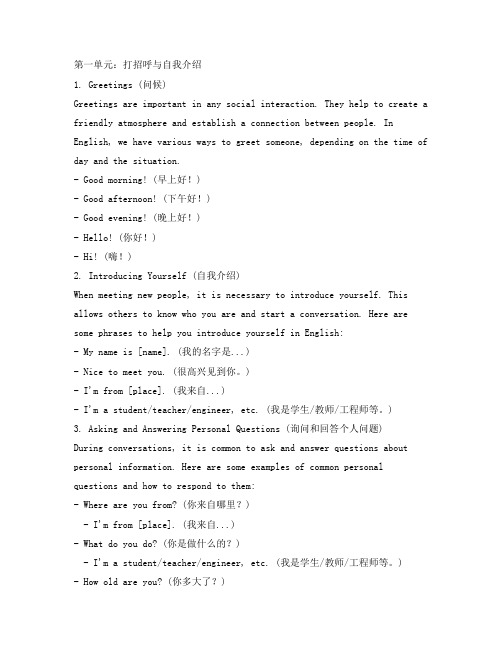
第一单元:打招呼与自我介绍1. Greetings (问候)Greetings are important in any social interaction. They help to create a friendly atmosphere and establish a connection between people. In English, we have various ways to greet someone, depending on the time of day and the situation.- Good morning! (早上好!)- Good afternoon! (下午好!)- Good evening! (晚上好!)- Hello! (你好!)- Hi! (嗨!)2. Introducing Yourself (自我介绍)When meeting new people, it is necessary to introduce yourself. This allows others to know who you are and start a conversation. Here are some phrases to help you introduce yourself in English:- My name is [name]. (我的名字是...)- Nice to meet you. (很高兴见到你。
)- I'm from [place]. (我来自...)- I'm a student/teacher/engineer, etc. (我是学生/教师/工程师等。
)3. Asking and Answering Personal Questions (询问和回答个人问题)During conversations, it is common to ask and answer questions about personal information. Here are some examples of common personal questions and how to respond to them:- Where are you from? (你来自哪里?)- I'm from [place]. (我来自...)- What do you do? (你是做什么的?)- I'm a student/teacher/engineer, etc. (我是学生/教师/工程师等。
新编实用英语第一册教材参考答案

新编实用英语第一册教材参考答案〔第六单元——第八单元〕天津工程职业技术学院英语教研室编制Unit 6Section 1 Put in Use : Practice 11.outdoor2.what to do3.bike4.woods5.view6.see more of nature7.barbecue grillsSection 1 Put in Use : Practice 21.Well, Dick. Have you read today's newspaper?2.Have you noticed a colored poster in the paper?3. Well, it's about a mountain climbing activity.4.It is organized by the Mountaineers' Club on Saturday morning. Are you interested?5 e on, Dick! Let's go together. Mountain climbing is a very good sport. It is good for our health,too.Section 1 Put in Use : Practice 31.What kind of recreation are you interested in2.Picnicking is a very good outdoor activity3.Where shall we have the picnic4.The air is fresh by the side of the lake5.Shall we try boating and fishing in the lake6.I'm glad you like all these activities7.Let's get prepared nowSection 11 Listen and Decode1.out-door2. what to do3.bike4.woods5.view6.see more of nature7.barbecue grillskeRecording the originalBob: Look, Xiao Li. What a clear day!Xiao Li:Yes, it looks very nice. A good day for outdoor activities.Bob:Right. And it will be good for us to spend time outdoors. What do you feel like doing exactly?Xiao Li: I haven't made up my mind yet. What do you think?Bob: How about a bicycle ride to the lake area?Xiao Li:Good idea! Let's take a ride through the woods.Bob:Yeah! It would be so nice to take in the beauty of nature.Xiao Li: Yes, indeed. We'd better go slowly so that we can see more of the view.Bob:And we can take deep breaths of the fresh air.Xiao Li: Now let's see what we should bring with us. Swimming suits?Bob:No, the water might be cold by now. Just some food and drinks. Oh, yes, and perhapsthe barbecue grills.Xiao Li: Barbecue grills? All right. With them we can have a good picnic by the lake.Bob:And how about the fishing rod and fishing line?Section 11 Listen and Respond1.Because the weather is so fine / lovely / nice and ideal for outdoor activities2.He thinks an outdoor activity will be good for their health3.They will go to the lake area.4.They will enjoy the woods, fresh air, beauty of nature, and a barbecue picnic by the lake.5.No, the water might be too cold for swimming.6.Yes, they will, because they will bring barbecue grills with them.7.Bob also wants to fish in the lakeSection 11 Listen and Match1.B2.C3.D4.DRecording the originalAmericans Love Outdoor CookingAmericans have a strong love for cooking outdoors. The minute the weather grows warm enough, families set up their barbecues and have their first garden meal of the season. On any summer evening, you can smell the charcoal smoke and grilling foods.What foods do they barbecue? Beef, pork and chicken are always popular, especially when they are cooked in a hot sauce. Many people like to barbecue fish, too. Some garden cooks also grill vegetables, including mushrooms and green peppers. A really clever cook will even cook a dessert over the charcoal.One reason Americans love outdoor cooking so much is that grilled foods taste so good. But there is another reason, too. At a barbecue, nobody worries about formal manners and dressing up. It is perfectly acceptable to wear old blue jeans, eat with your fingers, and get sauce on your face. That's all part of the true barbecue experience!Section 11 Listen and ConcludeAmericans have a strong love for cooking outdoors. The minute the weather grows warm enough, American families will have their first garden barbecue of the season. On any summer evening you can smell the charcoal smoke and grilling foods. Beef, pork and chicken are always popular. Some kinds of fish are especially popular to barbecue. Some cooks also grill vegetables.A really clever cook will even cook a dessert over the charcoal. Americans love outdoor cooking so much because grilled foods taste so good and a barbecue is informal. They can wear old blue jeans, eat with fingers, and they don't need to worry about sauce on their face. That's all part of the true barbecue experience.Section 111 Passage I : Read the Think1.D2.B3.D4.B5.A6.CSection 111 Passage I : Read the Complete 11.Without2.popular3.draw4.watch5.athletes6.challenge7.givenup8.answer9.confidently 10. Nowhere 11. Determined 12. SucceedSection 111 Passage I : Read the Complete 21.one of the most popular Olympic sports2.attracted and also worried3.excellent academic results4.given up everything5.you're feeling very tired6.only junior taking part7.National Championships 8.then the pain would be over 9.to train with 10.a taste for enduranceSection 111 Passage I : Read the Complete 31.tempted2.promising3.end up4.offer 5jumping. 6.punished 7.crowdsSection 111 Passage I : Read and Translate1.What has made the triathlon one of the most attractive Olympic sports?2.In order to do the research project, many scientists have given up their personal happiness.3.The audience has got tired of these often-repeated phrases.4.It will do us a lot of good to take part in more social activities.5.She is confident to come first at the Olympic Games.6.He is not quite sure if it is worth doing.7.They will realize the importance of environmental protection sooner or later.8.It's too late. It seems that I have to run all the way to school.Section 111 Passage I : Read and Simulate1. The performance seemed so interesting that all the people in the entire crowd is attracted.The cookery seemed so fascinating that I'm eager to have a try at once.2. Curiously, the children watched the experiment with full attention.Hopefully, he entered the final competition.3. We realized then that we had made a wrong decision. We ended up losing a very good opportunity.She realized then that they had cheated her. Her business ended up losing $100 000.4. I am afraid that if he doesn't follow our advice, he will run into trouble.I am afraid that if you miss the chance, it will be hard for you to get a second one.5. I was almost as good as my mother in cooking, but much less skilled in knitting.I was almost as good as they are in speed, but much weaker in endurance.6. With her devotion to the research, she will find a way to cure the disease sooner or later.With his devotion to writing, the novel will be published sooner or later.Section 1V Applied Writing : Read and SimulateSection 1V Applied Writing : Simulate and Create 1Section 1V Applied Writing : Simulate and Create 2Section 1V Applied Writing : Simulate and Create 3Unit 7Section 1 Put in Use : Practice 11.about2.how to3.that's4.details5.When6.New Year7.Will it8.Sichuan9.good at 10.How much 11.the end 12.sure 13.meet people 14.hear itSection 1 Put in Use : Practice 21.Martin, here is a ticket for you for the lecture of Chinese folk songs.2.It's on the coming Friday, 3:30 pm, in the lecture hall of the Arts Center.3.So Dr. Huang will give his lecture in English.4.I'm sure you'll enjoy the lecture.Section 1 Put in Use : Practice 31.I've got your invitation for the dinner party.2. Is there anything I can do?3. There isn't much difference between Chinese and English culture in this aspect.4.Some Chinese hosts may become too busy to serve themselves.5.Most guests will arrive a little bit earlier, according to Chinese custom.6.In China, hostesses generally want to look more attractive.Section 11 Listen and Decode1.baked2.America3.world, 4 pliment 5.interrupt 6.dance 7.mood Recording the originalChen goes to George's party. George is her friend from America.Chen:Hi, George!George:Hi, Chen! Glad you could make it.Chen:I wouldn't miss your party for the world.George:Thanks for the compliment.Chen:Here I've brought a cake, freshly baked.George:That's great. Come on in. I want you to meet some of my friends.Chen:OK.George:Hey, everybody! This is Chen. Chen, uh, this is everybody.Chen:Don't let me interrupt others.George:Do you want to dance, too?Chen:Let's drink some wine and get in the mood first.Section 11 Listen and Respond1.He is Chen's friend. He is from America.2.She likes it very much.3.They are dancing when Chen arrives.4.She has brought a freshly baked cake to the party.5.He wants Chen to meet some of his friends.6.She is going to have some wine to get in the mood.Section 11 Listen and Match1.B2.C3.D4.DRecording the originalI'm Trying to Be More Like SimonI'm trying to be more like my friend Simon. He is the kind of man who is good at everything he does — and I mean everything. Work, play, study and everything else. He is such a good talker, he could sell ice to an Eskimo. He makes friends instantly. Not only do people like him, plants do, too. People call his house the Plant Hospital. They take their dying plants to him and in two weeks the plants look great. Four years ago, he decided to move to Chicago and work with computers. Most people would begin by going to a computer school at home before making such a move. Not Simon. He went directly to Chicago and applied for lots of computer jobs —a field he knew nothing about. In the interviews, he studied exactly what employers wanted. With that knowledge, he created a perfect self-study plan and got a good job one year later. Now he lives where he wants, does what he wants, has great fun, and makes a lot of money.Section 11 Listen and ConcludeSimon is the kind of guy who is good at everything. He is such a good talker that he could sell ice to an Eskimo. Not only do people like him, plants do, too. People call his house the Plant Hospital because their dying plants would look great in two weeks under his care. Four years ago, he decided to move to Chicago and work with computers. At that time, he knew nothing about the field. But Simon went to interviews directly, thus he could learn exactly what employers wanted. He created a perfect self-study plan and got a good job one year later. Now Simon lives where he wants, does what he wants, has great fun, and makes a lot of money.Section 111 Passage I : Read the Think1. It's origin dates back to the arrival of some of the first European settlers in the New World.2. With the help of their native Indian neighbors3. It usually includes turkey, corn, sweet potatoes and pumpkin pie4.They will send a Christmas card home to express seasonal greetings5.Because it always has its "home, sweet home" flavorSection 111 Passage I : Read the Complete 11.dates back2.blessed with3.was observed4.includes5.ate6.Marks7.put up8.will not wait9.is expressed10. Holy Night11. cannot join 12. will send13.believed wine 14.talking over 15.still maintainsSection 111 Passage I : Read the Complete 21.which dates back to the arrival of the first European settlers in the New World2.who taught them how to plant corn, and how to hunt wild deer3.that early settlers and the Indians ate on the first Thanksgiving Day in 16214.although most will wait until a couple of weeks before Christmas Eve5.who cannot join the family6.they believe to be brought to them by Santa Claus7.Though Christmas is now celebrated widely the world overSection 111 Passage I : Read the Complete 31.dates back2.maintain3.has survived4. Responsible5. similar to6. put up7.fail to8.be believed9.marks 10.is observed 11.is blessed with 12.express 13.talkSection 111 Passage I : Read and Translate1.This city is / has been blessed with beautiful scenery and rich natural resources.2.The first Dragon-boat Festival was observed after the death of Qu Yuan, and people showed their respect to this great man in a unique way.3.A traditional Chinese birthday dinner usually includes chicken soup noodle.4.Some Chinese families will even start to prepare for the new year much early, although most will wait until a couple of weeks before Spring Festival.5.Their love for the country is expressed in the sweet melody "My Homeland".6.The football fans who could not join the club in the host matches will never fail to watch each game on TV.7.Though Guangdong dishes are popular the world over, many of them no longer maintain their special flavor.Section 111 Passage I : Read and Simulate1.However, the player would not have made the goal without the cooperation of his teammates However, many people would not have survived the flood without the help given by the PLA men.2.The time after the final examinations is the most relaxing of the busy termThe hour after midnight is the darkest time of the day.3.This desire is expressed in the article/essay "Three Days to See".This mood is expressed in the poem "Moonlight".4.Parents are kept busy with duties they believe to be offered by nature..Housewives are kept busy with chores they believe to be imposed upon them by society.5.The general way of practicing Yoga is similar to that for practicing Tai-ji.The traditional track races are similar to the modern ones.6.Though paper-cutting is now a popular art form almost the world over, it still maintains its oriental flavor.Though the CEO is now a well-known figure almost the world over, he still maintains his simple life style.Section 1V Applied Writing : Read and SimulateSection 1V Applied Writing : Simulate and Create 1先到百名者有奖--时机难得!著名作者现场签名--时机难得!!世界各国畅销书云集--时机难得!!!地点:天津市东北角新华书店时间:8月28号—9月3号, 上午8:00—下午8:00半Section 1V Applied Writing : Simulate and Create 2 Answer: Open...Unit 8Section 1 Put in Use : Practice 11. the matter2. very well3.have a look4.worry5.some medicine6.stop the pain7.Take the tablets8.several times a daySection 1 Put in Use : Practice 21.What's wrong? / What the matter /Are you all right? You look very pale.2.Oh, your leg is bleeding. You'd better lie down. Does that feel better/How are you feeling now?3.I have the first-aid kit here. Let's stop the bleeding first.4.You should go to see a doctor immediately. Want me to accompany you to the hospital? Section 1 Put in Use : Practice 31.Very soon. Are you sure you've all right? / Are you OK? You don't look quite yourself. / You don't look well.2.Oh, that's too bad. You'd better take a rest now. Have you had / taken any medicine?3.Look, this is medicated oil. You might want to rub some on your temples.4.But you'd better go to see a doctor. I'll accompany you to the clinic as soon as we return to the hotel.Section 11 Listen and Decode1.D2.B3.CRecording the originalLi:Why, Jack, are you all right? You don't look quite yourself.Jack:I'm feeling awful. I've got a terrible headache.Li:It might be a bad cold. Have you taken any medicine?Jack:I took some aspirin, but I still feel sick.Li:You'd better go to see a doctor immediately. Want me to go with you to the hospital? Jack:Oh, it's so nice of you. I do need your help. I just can't think straight at the moment....(In the hospital, a doctor is receiving Jack.)Doctor: What's the matter?Jack:I've got a terrible headache, a sore throat, and my whole body hurts badly.Doctor:Let me see. Oh, you're running a high fever.Jack:Am I seriously ill, doctor?Doctor:Don't worry. I think you've just got a bad cold. But you'd better take an X-ray first. Jack:Thank you, doctor.Section 11 Listen and Respond1.No, Jack does not look quite himself. / No, Jack does not look very well.2.He is feeling awful. He is suffering from a bad headache.3.Yes, he took some aspirin.4.Li suggests that Jack go to see a doctor immediately.5.Yes, he needs Li's help because he can't think straight at the moment.6.He's got a terrible headache, a sore throat, and his whole body hurts badly.7.Jack may have got a bad cold8.He says "Don't worry. I think you've got a bad cold."9.He asks Jack to take an X-ray first.Section 11 Listen and JudgeRecording the originalFive Ways to Improve Your SkinNowadays, people pay more and more attention to their skin. Do you know how to take care of your skin? Does your skin feel dry and rough? Does your skin look dull and tired? Don't worry! Here are some points that can make all the difference.Not enough sleep leaves your skin looking tired. So don't stay up any longer than you have to, and give your skin the chance to relax and have a good rest!Air-conditioning and not drinking enough water can make your skin look dry. So make sure you drink at least eight glasses of water each day to nourish your skin from the within.Taking a short walk on a fine day will not only refresh you, it will also wake up your skin. Make sure you wash all the make-up off your face before going to bed. Your skin needs a few deep and good breaths just like you do!Your diet should be full of the right vitamins and minerals. They will help keep your skin looking good and healthy. Fruit and vegetables are the best things to make you look beautiful.Always rub your skin gently. The movements upwards and outwards will help reduce puffiness. Doing this massage five minutes, twice a week, will leave your skin looking young and beautiful!Section 11 Listen and Complete1.skin2.rest3.dry4.within5.walk6.breath7.minerals8.vegetables9.outwards 10.youngSection 11 Listen and ConcludeNowadays, people pay more and more attention to their skin. If we don't know how to take care of our skin, our face may look dry and tired. The passage offers us some points that can make all the difference. The speaker first advises us to have enough sleep. He also asks us to drink at least eight glasses of water every day. Taking a short walk on a fine day will also wake up our skin. In the evening, we should wash all the make-up off our face so that our skin can breathe.Our diet should be full of the right vitamins and minerals. They will help keep the skin looking good. Fruit and vegetables are the best things to make our skin beautiful.Rub our skin gently. The movements upwards and outwards will help reduce puffiness. Doing this massage for five minutes, twice a week, will leave our skin looking young and beautiful!Section 111 Passage I : Read the Think1.They may suffer from different kinds of illness.2.They may suffer from heat-stroke, injury, skin and stomach trouble and car-sickness.3.Because it may help to cure or prevent the illness he / she may suffer from during traveling.4.Diarrhea5.Because they are proved to be very effective and safe to relieve certain health problems.6.It is good for headache, insect bites and other sicknesses.7.Medicated oil and Yunnan White Medicine Spray.Section 111 Passage I : Read and Judge1.D2.C3.C4.ASection 111 Passage I : Read the Complete1.such as2.caused by3.first-aid4.traditional5.helpful for6.acclimatized to7.for instance 8.introduced to 9.soothes 10.satisfying effect 11.suggested 12.reluctant Section 111 Passage I : Read and Translate1.These friends from abroad have visited such cities in China as Xi'an, Guilin, and Dalian.2.This skin problem is a trouble. It will cause big trouble3.Don't worry. You are just not acclimatized to the new place yet.4.This herb pillow will greatly reduce the pain of a stiff neck.5.This method is indeed effective. I do appreciate your help.6.Although the ad sounds very convincing, she is still reluctant to order the new product. Section 111 Passage I : Read and Simulate1.We may be fooled by certain tricks such as sweet words and overstating.She may be touched by certain actions such as a hug and a kiss.2.You will get too disappointed or have a bad temper with such a poor service.She may get too far behind or have an accident with such an old bicycle.3.Other pets may exhibit bad behavior if they cannot adapt to a new environment.Other students may have emotional problems if they are not accustomed to the competition.4.Massage is also effective for a stiff neckT aijiquan Exercise is also good for cancer patients.5.In some cases, precaution is of the biggest necessity.In any case, keeping calm is of the biggest importance.6.They will not only like your performance, but also like the lively atmosphere of the party. We will not only remember your friendship, but also appreciate the help fromSection 1V Applied Writing : Simulate and Create 1Section 1V Applied Writing : Simulate and Create 2主编:崔斌天津工程职业技术学院参考文献:?新编实用英语〔第二版〕第一册? 高等教育出版社2021, 9工本费:8.00元〔内部资料妥善保管〕。
实用英语第一册课件

美心英语 上海交通大学出版社
Focus 1 Section I
Intensive Reading Unconditional Love
实用英语第一册电子教案
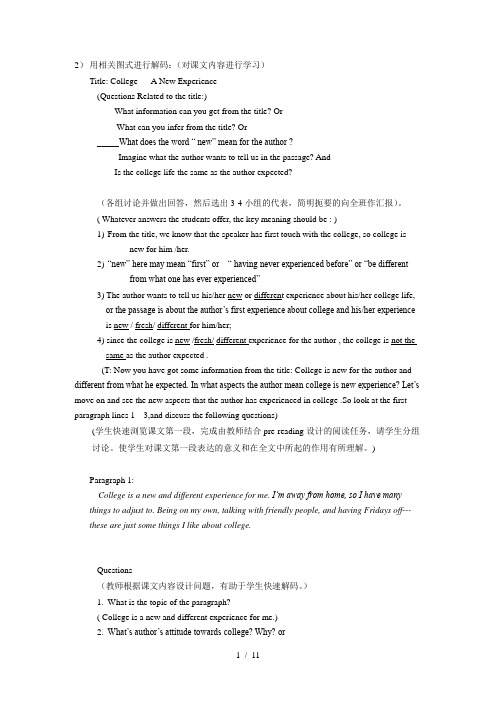
2)用相关图式进行解码:(对课文内容进行学习)Title: College---- A New Experience(Questions Related to the title:)____What information can you get from the title? Or____ What can you infer from the title? Or_____What does the word “ new” mean for the author ?____Imagine what the author wants to tell us in the passage? And____Is the college life the same as the author expected?(各组讨论并做出回答,然后选出3-4小组的代表,简明扼要的向全班作汇报)。
( Whatever answers the students offer, the key meaning should be : )1)From the title, we know that the speaker has first touch with the college, so college isnew for him /her.2)“new” here may mean “first” or “ having never experienced before” or “be differentfrom what one has ever experienced”3) The author wants to tell us his/her new or different experience about his/her college life,or the passage is about the author’s first experience about college and his/her experienceis new / fresh/ different for him/her;4) since the college is new /fresh/ different experience for the author , the college is not thesame as the author expected .(T: Now you have got some information from the title: College is new for the author and different from what he expected. In what aspects the author mean college is new experience? Let’s move on and see the new aspects that the author has experienced in college .So look at the first paragraph lines 1---3,and discuss the following questions)(学生快速浏览课文第一段,完成由教师结合pre-reading设计的阅读任务,请学生分组讨论。
21世纪大学实用英语第一册
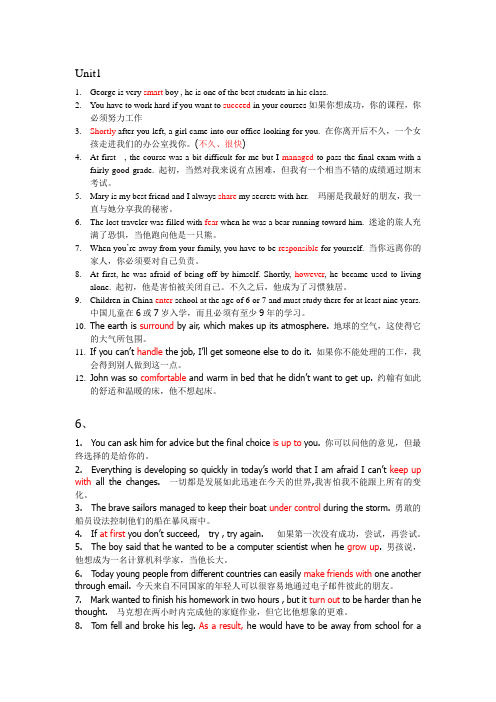
Unit11.George is very smart boy , he is one of the best students in his class.2.Y ou have to work hard if you want to succeed in your courses如果你想成功,你的课程,你必须努力工作3.Shortly after you left, a girl came into our office looking for you. 在你离开后不久,一个女孩走进我们的办公室找你。
(不久、很快)4.At first , the course was a bit difficult for me but I managed to pass the final exam with afairly good grade. 起初,当然对我来说有点困难,但我有一个相当不错的成绩通过期末考试。
5.Mary is my best friend and I always share my secrets with her. 玛丽是我最好的朋友,我一直与她分享我的秘密。
6.The lost traveler was filled with fear when he was a bear running toward him.迷途的旅人充满了恐惧,当他跑向他是一只熊。
7.When you’re away from your family, you have to be responsible for yourself. 当你远离你的家人,你必须要对自己负责。
8.At first, he was afraid of being off by himself. Shortly,however, he became used to livingalone. 起初,他是害怕被关闭自己。
不久之后,他成为了习惯独居。
- 1、下载文档前请自行甄别文档内容的完整性,平台不提供额外的编辑、内容补充、找答案等附加服务。
- 2、"仅部分预览"的文档,不可在线预览部分如存在完整性等问题,可反馈申请退款(可完整预览的文档不适用该条件!)。
- 3、如文档侵犯您的权益,请联系客服反馈,我们会尽快为您处理(人工客服工作时间:9:00-18:30)。
14
♦ considering prep. 鉴于,考虑到 鉴于,
Considering his poor health, I’m afraid he is unable to undertake the heavy task. ♦ considerate a. 体贴的,替人着想的 体贴的, It is said that Mary is a considerate girl. ♦ considered a. 深思熟虑的 Three days later he made a considered decision. ♦ considerable a. 相当大的,相当多的 相当大的, His hard work earned him a considerable amount of money.
6
♦ -ence/-ance:
confident --- confidence (信心 信心) 信心 depend --- dependence --- independence The nation gained ____ only five years ago. (depend) independence Have ____ in yourself, and you’ll be more likely to win the contest. (confident) confidence
13
♦feasible adj. 可行的 Can you think of a feasible plan to settle the problem? 你能想出一个可行的计划来解决这个问 题吗? 题吗? ♦latter adj. 后面的,后者的 后面的, Both Tom and Bob are leaving. The former is going to Beijing and the latter is returning to his hometown.
实用英语第二册辅导
1
考试题型
♦ Listening comprehension (听力理解 听力理解) 听力理解
♦ ♦ ♦ ♦ ♦
十个句子, 十个句子,10% 一篇Spot dictation,5% 一篇 , Vocabulary and structure (词汇与结构 25% 词汇与结构) 词汇与结构 Reading comprehension (阅读理解 阅读理解) 阅读理解 三篇文章, 三篇文章,30% Cloze (完型填空 完型填空) 完型填空 二十道题目, 二十道题目,10% Word formation (词形转换 词形转换) 词形转换 十道题目, 十道题目,5% Translation (翻译 翻译) 翻译 五句句子, 五句句子,15%
9
♦ -ous:
humor --- humorous (幽默的 幽默的) 幽默的 space --- spacious (宽敞的 宽敞的) 宽敞的 The ____ room can seat more than 50 guests. (space) spacious ♦ -y: fun --- funny sun --- sunny What a ____ man he is! (fun) funny
18
♦ work out 解决,算出 解决, He spent two good hours working out that complicated equation. ♦ identify v. 辨认,识别 辨认, Yesterday he was asked to go to the police station to identify the robber. ♦ encounter v. n. 遭遇,(偶然 遇到 遭遇, 偶然 偶然)遇到 I encountered a former classmate yesterday. You are likely to encounter many difficulties when carrying out the project.
7
♦ -ive:
effect --- effective decide --- decisive What he said had a ____ effect on the development of the company. (decide) decisive ♦ -ly: friend --- friendly leisure --- leisurely Every day after dinner, the couple go out for a leisurely walk. (leisure)
16
♦ be composed of /consist of/ constitute 前两者是‘ 组成’ 前两者是‘由…组成’,consist of 不用被 组成 动语态。 动语态。 Lunch consists of hot coffee, a soup and some vegetable or meat. 午餐由热咖啡、汤、 午餐由热咖啡、 以及一些蔬菜或肉组成。 以及一些蔬菜或肉组成。 The paper is composed of three different parts. constitute v. 组成,构成 组成, Seven days constitute a week. 一周有七天。 一周有七天。 Import duties constitute a heavy burden upon consumers.
4
♦ -ment:
argue ---argument (争论 争论) 争论 invest --- investment (投资 投资) 投资 advertise --- advertisement He invested a large sum of money in the project. (investment) Have you tried the product ____ on TV recently? (advertisement) advertised
17
♦ slim adj. 苗条的;微小的,渺茫的 苗条的;微小的, The fashion model had a very slim figure. We had only slim hopes/ chances of success. ♦ finally adv. 最终,终于 最终, I’d been trying the experiment many times, and finally I got a desirable result. ♦ confident a. 自信的;有信心的 自信的; Peter is confident of winning the post as the assistant to the managing director. We are confident of success.
20
♦contribute to 导致,有助于 导致, Fresh air and physical exercises will contribute a lot to your health. ♦manage to do sth.: 设法做成功某事 Although it was difficult, he managed to get two tickets for the concert. He worked very hard and managed to pass the exam. [比较 succeed in doing sth. 成功做某事 比较] 比较 try to do s
3
♦ -ion :
indicate --- indication (表明 表明) 表明 apply --- application (申请,应用 申请, 申请 应用) conclude --- conclusion All the findings indicated that it’s impractical to build a chemical plant in that area. (indication) Have you filled in the application form for your passport yet? (apply)
19
♦ worthwhile
It is worthwhile to do sth. Do you think it worthwhile to make such great efforts? worth I can assure you that the book is worth reading./ be worth a careful study worthy The plan is worthy of consideration. The plan is worthy to be considered.
10
♦ -ly:
vague --- vaguely (模糊的 模糊的) 模糊的 careful --- carefully I can only ____ remember what happened in that accident. (vague) vaguely
11
Vocabulary
12
♦crash v.n. 撞击;闯入 撞击; The two cars crashed into each other. It is reported that there was an air crash near this area. ♦explore v. 探险,勘查;研究,探讨 探险,勘查;研究, The team explored the territory from St. Louis to the Pacific. 这支队伍勘查了从 圣路易斯到太平洋海岸之间的地区。 圣路易斯到太平洋海岸之间的地区。 They try to explore different ways to solve the problem.
